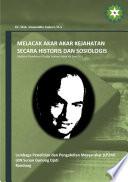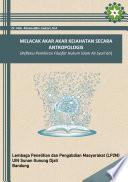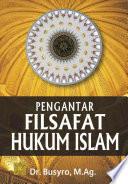
Melacak Akar Akar Kejahatan Secara Historis dan Sosiologis (Refleksi Pemikiran Filsafat Hukum Islam Ali Syari’ati)
Isi dari buku ini adalah sebagai berikut: (1). Koherensi historis sosiologis pemikiran filsafat hukum islam Ali Syari'ati, lebih disemangati oleh upaya mengembalikan masyarakat Iran, terutama generasi mudahnya, yang tergila-gila pada Marxisme dan pola hidup Barat lainnya, kepada pangkuan Iman dan Islam kembali, tentu dengan muatan syari’at Islam melalui interpretasi kritis dan orisinalnya; (2). Manusia adalah makhluk bidimensional, karena menurut kisah kejadian dan penciptaannya, manusia diciptakan dari dua unsur yang saling berlawanan atau berkontradiksi satu sama lain secara subjektif, bathiniah dan berlangsung dalam esensinya, yaitu: roh Allah dan lempung busuk. Manusia benar-benar merupakan ajang kontradiksi ,pertarungan konstan yang berlangsung secara dialektis.(3). Allah menyampaikan rencana-Nya kepada para malaikat, bahwa Dia akan menciptakan khalifah-Nya di atas muka bumi, yaitu: Adam dan keturnannya. Oleh karena itu, tanpa ditunda-tunda lagi para malaikat serempak mengajukan hipotesis, berdasarkan hasil observasi yang deskriptif metodis pada pengalaman masa lalu (QS., 56:61-62), tentang sesuatu perbuatan yang akan dilakukan oleh manusia dalam perjalanan hidupnya selama di atas muka bumi, yang akan menumpahkan darah, berbuat kejahatan, menyebarkan kebencian dan balas dendam, sebagaimana firman Allah yang artinya :“Ingatlah ketika Tuhanmu berfirman kepada para malaikat : Sesungguhnya Aku akan menjadikan seorang khalifah di muka bumi. Mereka berkata : Mengapa Engkau akan menjadikan (khalifah) di bumi itu orang yang akan membuat kerusakan padanya dan menumpahkan darah, padahal kami senantiasa bertasbih dengan memuji Engkau dan mensucikan Engkau. Tuhan berkata: Sesungguhnya Aku mengetahui apa yang tidak kamu ketahui” (QS., 2:30). (4).Proses kontradiksi dialektis yang terjadi dalam diri setiap individu manusia dan sejarah itu, terus menerus bergerak maju secara progresif evolusioner ke arah puncak kesempurnaan tertinggi sebagai sintesis, yaitu: ketika sudah sampai di sisi Allah atau roh Allah bagi setiap individu manusia, dan bagi sejarah apabila kaum mustadh’afiin telah berhasil menata sistem sosial dan masyarakat yang disebut sebagai ummat, dengan tata pemerintahan yang disebut sebagai kesucian kepemimpinan, yang lebih menekankan pada sistem dan suasana yang kondusif, bukan kepada personifikasi individu sang pemimpin, berpandangan hidup tauhid yang melihat segala sesuatu sebagai emperium tunggal, dan bahwa pembagian segala sesuatu dalam dua hal yang berpasangan secara kontradiktif itu sesungguhnya bukanlah dualisme, melainkan pembagian yang nisbi sesuai dengan daya nalar dan kognitif manusia, diperlukan dalam kerangka epistemologi bukan ontologi.
- ISBN 13 : 6239372099
- ISBN 10 : 9786239372095
- Judul : Melacak Akar Akar Kejahatan Secara Historis dan Sosiologis (Refleksi Pemikiran Filsafat Hukum Islam Ali Syari’ati)
- Pengarang : Dr. Moh. Ahsanuddin Jauhari, M.A, M.A, M.A, M.A, M.A, M.A, M.A, M.A,
- Kategori : Religion
- Penerbit : LP2M UIN Sunan Gunung Djati Bandung
- Bahasa : un
- Tahun : 2020
- Halaman : 160
- Google Book : http://books.google.co.id/books?id=TBjqDwAAQBAJ&dq=intitle:Filsafat+Hukum&hl=&source=gbs_api
-
Ketersediaan :
Isi dari buku ini adalah sebagai berikut: (1).







